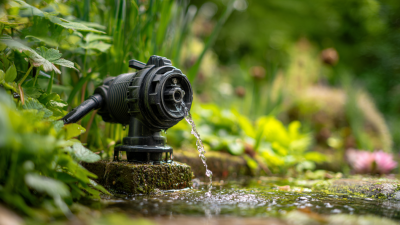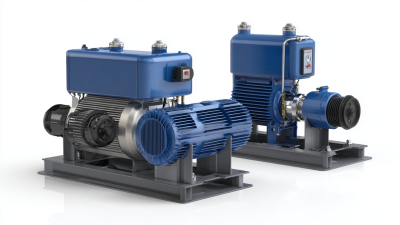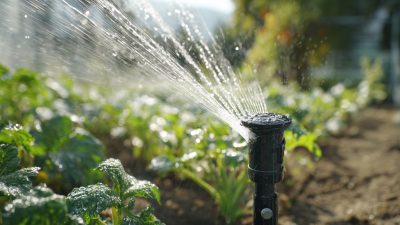The Ultimate Guide to Understanding How Water Pumps Transform Our Daily Lives
Water pumps play a crucial role in enhancing our daily lives, serving as indispensable components in various applications ranging from agriculture to urban infrastructure. According to the Global Water Pump Market report, the industry is expected to reach a value of approximately $65 billion by 2025, highlighting the increasing reliance on efficient water management systems. With advancements in technology, modern water pumps are designed to optimize energy consumption and improve water distribution in residential, commercial, and industrial settings. For instance, the deployment of variable frequency drives has shown to enhance the efficiency of water pumps by up to 50%, significantly reducing operational costs. Understanding the types and functionalities of water pumps not only illuminates their technical aspects but also showcases their profound impact on water conservation and sustainability efforts worldwide.

Impact of Water Pumps on Household Water Consumption Efficiency
 Water pumps play a crucial role in enhancing household water consumption efficiency, making our daily lives significantly more convenient. By transporting water from various sources, such as wells or municipal systems, these pumps ensure that households have immediate access to the essential resource of water. Their ability to deliver water at high pressure increases the effectiveness of plumbing systems, allowing for improved performance in activities like bathing, cooking, and cleaning. With the advancements in technology, modern water pumps can operate with greater energy efficiency, reducing electricity consumption while maximizing output.
Water pumps play a crucial role in enhancing household water consumption efficiency, making our daily lives significantly more convenient. By transporting water from various sources, such as wells or municipal systems, these pumps ensure that households have immediate access to the essential resource of water. Their ability to deliver water at high pressure increases the effectiveness of plumbing systems, allowing for improved performance in activities like bathing, cooking, and cleaning. With the advancements in technology, modern water pumps can operate with greater energy efficiency, reducing electricity consumption while maximizing output.
Moreover, water pumps contribute to sustainable water management practices within households. By utilizing smart pumping systems equipped with sensors and automation technology, families can monitor their water usage in real-time and make informed decisions to reduce waste. This not only promotes responsible water consumption but also lowers utility bills. Additionally, efficient water pumps minimize the risk of leakage and excess water runoff, ultimately leading to a more eco-friendly approach to domestic water use. As water scarcity becomes a pressing issue globally, the significant impact of water pumps on household water consumption efficiency cannot be overstated, proving vital for both economic and environmental sustainability.
Key Statistics: Water Pump Usage in Agriculture and Its Economic Implications
Water pumps play a pivotal role in agriculture, directly influencing crop yield and farming efficiency. It is estimated that over 70% of the world’s freshwater withdrawals are used for agricultural purposes, with a significant portion of this relying on various types of water pumps. These devices facilitate irrigation, allowing farmers to maintain optimal soil moisture levels essential for crop growth. In regions prone to drought, pumps become indispensable in ensuring that plants receive adequate water, thereby safeguarding food production and stability.
The economic implications of water pump usage in agriculture are substantial. Efficient irrigation systems enabled by pumps can increase crop production by up to 40%, directly affecting farmers' income and food supply. Data shows that countries investing in water pump technology experience improved agricultural productivity, which can lead to a reduction in food prices and enhanced food security. Moreover, as agriculture is a significant contributor to many economies, optimizing water usage through effective pumping systems can stimulate local economies, create jobs, and ultimately contribute to national economic growth.

Innovative Water Pump Technologies Enhancing Urban Water Supply Systems
Innovative water pump technologies are revolutionizing urban water supply systems, enhancing efficiency and sustainability. According to a report by the International Water Association, as urban populations surge, effective water management has become paramount to ensure access to safe drinking water. Advanced pumping solutions, such as smart pumps equipped with IoT technology, allow for real-time monitoring and optimization, significantly reducing energy consumption by up to 30%. These improvements not only lower operational costs but also play a crucial role in minimizing the environmental impact of urban water pumping operations.
Implementing energy-efficient water pumps is essential for urban planners. One tip is to consider variable frequency drives (VFDs) that adjust pump speed based on demand, ensuring that energy is used only when necessary. This can lead to substantial savings over time. Additionally, embracing renewable energy sources for running these pumps can further enhance sustainability, with studies indicating that solar-powered pumps can reduce carbon footprints significantly.
Another important consideration is the integration of predictive maintenance systems. By utilizing data analytics, cities can anticipate pump failures before they occur, thereby decreasing downtime and ensuring a reliable water supply. Regular monitoring and maintenance not only improve performance but also extend the lifespan of the equipment, making it a wise investment for urban water systems.
Maintenance Tips for Prolonging Water Pump Lifespan and Performance
Water pumps play a crucial role in our daily lives, providing essential services ranging from irrigation to household water supply. To ensure these pumps function optimally, regular maintenance is necessary. One of the key tips for prolonging the lifespan of your water pump is to keep it clean and free from debris. Regularly check and remove any dirt or foreign objects from the intake screens and filters. This simple step can prevent clogging and enhance performance.
Additionally, lubricating the moving parts of the pump can significantly improve efficiency. Use a high-quality lubricant recommended by the manufacturer to reduce friction and wear. It’s also vital to monitor the pump for any unusual noises or vibrations, which may indicate potential issues. Timely intervention can prevent minor problems from escalating into costly repairs. Regularly checking the pump’s seals and hoses for signs of wear and replacing them as needed can further extend its lifespan and functionality.
Future Trends: The Role of Smart Water Pumps in Sustainable Water Management
As we move towards a more sustainable future, the role of smart water pumps is becoming increasingly vital in water management systems. The integration of information technology, artificial intelligence, and renewable energy sources is transforming traditional water pumping methods into intelligent systems that optimize water usage. For instance, smart water pumps are designed to monitor real-time data, adjust operations based on demand, and significantly reduce waste, thereby contributing to a more sustainable approach to water management.
The market for smart water pumps is expected to experience significant growth, with forecasts predicting an increase from $970 million in 2024 to $1.75 billion by 2032, representing a compound annual growth rate of 7.37%. This trend reflects the increasing recognition of the importance of smart technologies in enhancing efficiency and reducing the carbon footprint in various sectors, including residential, industrial, and agricultural applications. As consumers and businesses prioritize sustainability, the adoption of smart water pumps will play an essential role in addressing the challenges of resource management and environmental conservation.
The Impact of Smart Water Pumps on Water Consumption
This bar chart illustrates the trend in water consumption over the years 2019 to 2023, highlighting the impact of smart water pumps on reducing consumption levels as sustainable practices gain traction.
Related Posts
-

Top 5 Drainage Pumps for Efficient Water Removal: A Comprehensive Buyer’s Guide
-

Innovative Uses of Small Water Pumps in Modern Agriculture Boosting Efficiency and Sustainability
-

Transform Your Garden: The Ultimate Guide to Submersible Water Pumps for Efficient Irrigation
-

The Essential Guide to Choosing the Right Submersible Pump for Your Needs
-

Exploring Water Pump Innovations for Home Use at the 2025 China Import and Export Fair
-

What are the Key Features of Modern Irrigation Pumps?
